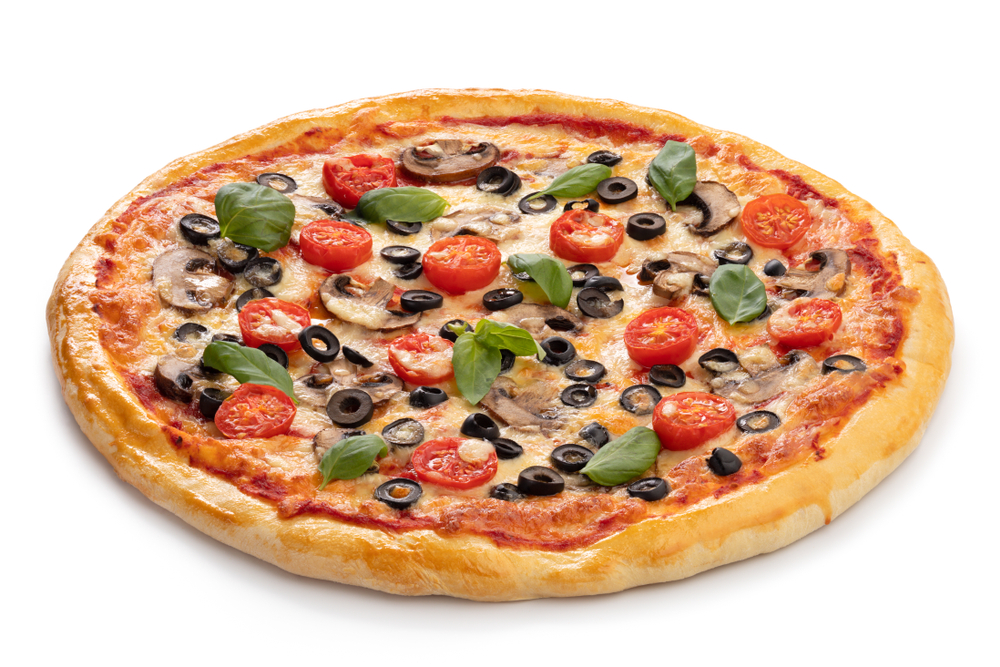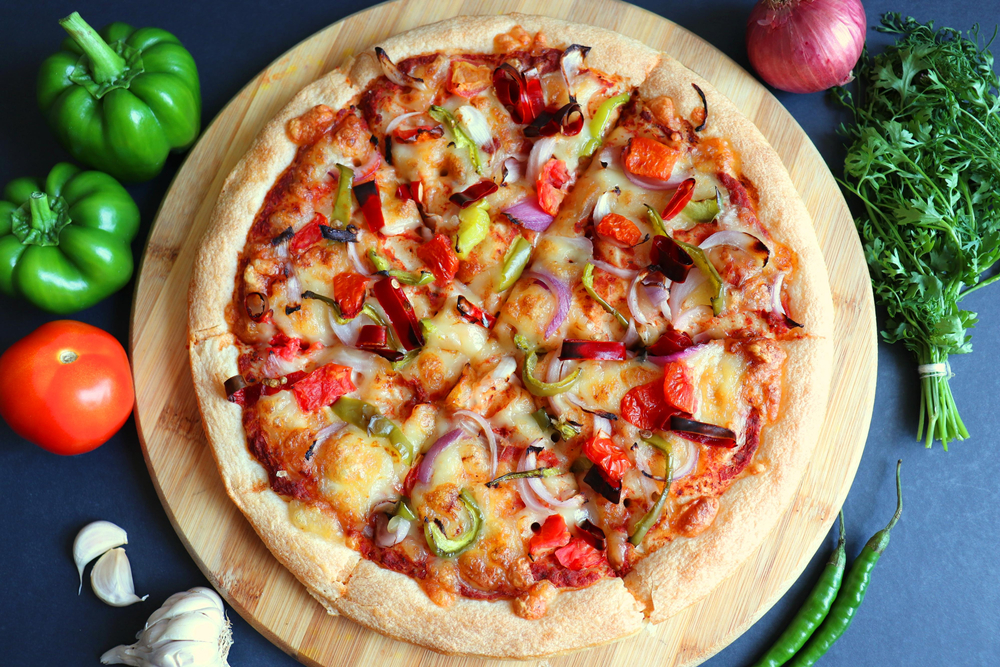Diets that are vegan are becoming more and more popular and for good reason. It is a manner of eating that is more compassionate toward animals, healthier for the environment, and can have a number of other advantages.

Whether vegan pizza is healthier than conventional pizza is one subject that frequently comes up. In order to respond to this query and give you the information you need, we conducted some research.
Vegan pizza can be a healthier alternative to typical pizza, which is frequently rich in calories, fat, and sodium.
Vegan pizza can be a heart-healthy option that is strong in fiber and vitamins if whole-wheat dough, wholesome plant-based toppings, and low-fat cheese are used.
It’s crucial to remember, though, that not all vegan pizza is made equal. The vegan options available on the market sometimes come with toxic fats and chemicals and are heavily processed.
What is Vegan Pizza?
As we explore the topic of whether vegan pizza is healthier, it’s important to first understand what vegan pizza is.

Simply put, vegan pizza is a pizza that is made without any animal products, including cheese, meat, and dairy. Instead, it is made with plant-based ingredients, making it a plant-based alternative to traditional pizza.
Veganism and plant-based diets have been gaining popularity in recent years as more people are becoming aware of the health and environmental benefits of reducing their meat and dairy consumption.
Vegan pizza is a perfect example of a plant-based alternative that allows people to enjoy their favorite food while also being mindful of their health and the environment.
The crust of vegan pizza is usually made with whole wheat flour, which is higher in fiber than white flour.
This means that vegan pizza can be a good source of nutrients like fiber and vitamins. Additionally, vegan pizza often contains more vegetables than traditional pizza, providing even more vitamins and minerals.
One of the main concerns with traditional pizza is its high saturated fat content, which can contribute to heart disease and other health problems.
Vegan pizza, on the other hand, is typically lower in fat since it doesn’t contain cheese or meat. Vegan cheese is often used as a substitute for traditional cheese, and it is typically lower in fat and cholesterol.
Overall, vegan pizza is a plant-based alternative that can be a healthier option for those who are looking to reduce their meat and dairy consumption.
By using plant-based ingredients, vegan pizza can provide a good source of nutrients while also being lower in fat and cholesterol.
Is Vegan Pizza Healthier Than Traditional Pizza?
When it comes to choosing between traditional pizza and vegan pizza, the question of which one is healthier often arises.

In this section, we will explore the differences between vegan pizza and traditional pizza in terms of calorie content, nutrition, fat, and sodium.
Calorie Comparison
In general, vegan pizza is lower in calories than traditional pizza. This is because vegan pizza typically does not contain cheese or meat toppings, which are high in calories.
Instead, vegan pizza is made with plant-based ingredients such as vegetables, fruits, and grains, which are lower in calories.
For example, a slice of traditional cheese pizza can contain around 300 calories, while a slice of vegan pizza can contain around 200 calories.
Nutrition Comparison
Vegan pizza is often considered to be more nutritious than traditional pizza. This is because vegan pizza is made with whole, unprocessed plant-based ingredients, which are rich in vitamins, minerals, and fiber.
In contrast, traditional pizza is often made with processed meat and refined wheat flour, which are low in nutrients. By choosing vegan pizza, we can increase our intake of essential nutrients such as protein, vitamins, and minerals.
Fat Content Comparison
Vegan pizza is typically lower in saturated fat than traditional pizza. This is because vegan pizza does not contain cheese or meat toppings, which are high in saturated fat.
Instead, vegan pizza is often made with healthy fats such as avocado, nuts, and olive oil. By choosing vegan pizza, we can reduce our intake of saturated fat, which is associated with an increased risk of heart disease.
Sodium Content Comparison
Vegan pizza is often lower in sodium than traditional pizza. This is because vegan pizza does not contain processed meat or cheese, which is high in sodium. Instead, vegan pizza is often made with fresh vegetables and herbs, which are low in sodium.
By choosing vegan pizza, we can reduce our intake of sodium, which is associated with an increased risk of high blood pressure.
Overall, vegan pizza can be a healthier option than traditional pizza. By choosing vegan pizza, we can increase our intake of nutritious plant-based ingredients, reduce our intake of saturated fat and sodium, and enjoy a delicious and healthy meal.
Ingredients in Vegan Pizza
When it comes to vegan pizza, the ingredients used are key to making it a healthier option. Here are some of the main ingredients you’ll find in vegan pizza:
Crust
The crust is the foundation of any pizza, and in vegan pizza, it can be made from a variety of ingredients.
Whole-grain crusts made from whole-wheat flour are a healthier option than those made from refined flour. Thin-crust pizza is also a good choice because it contains fewer calories than thicker crusts.
Sauce
Tomato sauce is a classic choice for pizza, and it’s naturally vegan. However, some processed sauces may contain added sugar and other unhealthy ingredients. Look for sauces made with simple ingredients like tomatoes, herbs, and olive oil.
Cheese Alternatives
Cheese is a staple ingredient in pizza, but in vegan pizza, cheese alternatives are used. These can be made from soy, nuts, or tofu.
Some cheese alternatives may contain processed ingredients, so it’s important to read the label carefully. Look for options that are made from whole foods and have fewer ingredients.
Toppings
When it comes to toppings, the sky’s the limit. Vegan pizza can be loaded with healthy toppings like vegetables, herbs, and plant-based proteins.
Healthy toppings include vegetable toppings like artichoke, zucchini, and other fresh veggies. Plant-based proteins like tofu and seeds can also be used to add flavor and texture to the pizza.
Vegan pizza can be a healthier option than traditional pizza. By choosing whole-grain crusts, simple sauces, and healthy toppings, we can create a delicious and nutritious pizza that we can enjoy guilt-free.
Health Benefits of Vegan Pizza
When it comes to pizza, many people assume that it’s an unhealthy option. However, with the rise of veganism, plant-based pizzas have become a popular alternative.

In this section, we will explore the health benefits of vegan pizza and why it can be a nutritious option for those who are health-conscious.
Lower Saturated Fats
One of the main benefits of vegan pizza is that it is lower in saturated fats. Traditional pizza typically contains high levels of saturated fats, which can increase the risk of heart disease.
However, vegan pizza is made with plant-based ingredients, which are naturally lower in saturated fats. For example, a slice of dairy-free cheese contains less saturated fat than regular cheese.
Lower in Calories
Another benefit of vegan pizza is that it is lower in calories. Plant-based pizzas typically have fewer calories than meat or dairy-based pizzas.
This is because they are made with ingredients that are naturally lower in calories, such as vegetables and whole grains.
Rich in Nutrients
Vegan pizza is also rich in nutrients. Plant-based ingredients are packed with vitamins, minerals, and other nutrients that are essential for good health.
For example, vegan pizza can be a good source of protein, fiber, calcium, and potassium.
Suitable for Dietary Restrictions
Vegan pizza is also a great option for those with dietary restrictions. It is a cholesterol-free and dairy-free alternative to traditional pizza, making it a good choice for those who are lactose intolerant or have high cholesterol.
Additionally, it can be a good option for those who are trying to follow a low-fat or low-sodium diet.
In summary, vegan pizza can be a healthy and nutritious option for those who are looking for a plant-based alternative to traditional pizza.
It is lower in saturated fats and calories, rich in nutrients, and suitable for dietary restrictions. By choosing vegan pizza, we can enjoy a delicious meal without compromising our health.
Conclusion
We have learned that vegan pizza can be a healthy option for those who are looking for a low-calorie, low-fat, and low-sodium alternative to traditional pizza.
By choosing a whole wheat crust and topping it with fresh vegetables, we can increase our fiber and vitamin intake while reducing our risk of weight gain and type 2 diabetes.
It is important to pay attention to the labels and ingredients of vegan meats and cheeses, as some may contain unhealthy fats and high levels of sodium.
However, by selecting fresh and natural ingredients, we can enjoy a delicious and nutritious pizza that is both satisfying and good for our health.
Furthermore, vegan pizza can help lower our cholesterol levels and improve our digestion due to its high fiber content.
Additionally, by incorporating antioxidant-rich toppings such as tomatoes, bell peppers, and spinach, we can further boost our overall health and well-being.
Vegan pizza can be a healthy choice when consumed in moderation and with the right ingredients. By making conscious choices and selecting fresh and natural toppings, we can indulge in a delicious and guilt-free pizza that satisfies our cravings while supporting our health goals.







Add comment